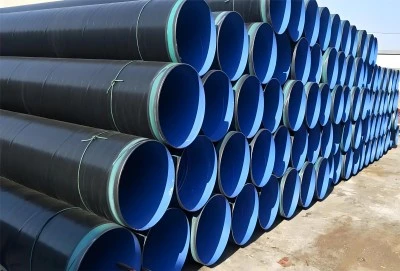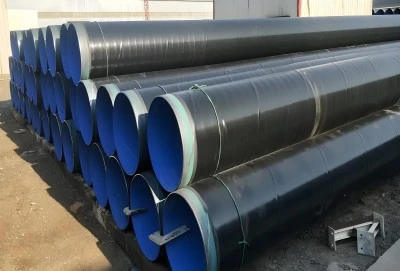Fusion Bonded Epoxy (FBE) coated steel pipes have become an industry standard in pipeline infrastructure due to their exceptional corrosion resistance and durability. The lifespan of these pipes can vary significantly depending on several critical factors. Understanding these factors is essential for pipeline operators, engineers, and maintenance professionals to ensure optimal performance and longevity of their pipeline systems. This comprehensive guide explores the key elements that influence the service life of FBE coated steel pipes.
|
|
|
Quality Of Surface Pretreatment
Surface pretreatment is perhaps the most crucial factor determining the longevity of FBE coated steel pipes. The effectiveness of the coating system largely depends on how well the steel surface is prepared before application. A properly prepared surface creates an optimal foundation for coating adhesion and long-term performance.
The surface preparation process typically involves several critical steps. First, the steel surface must be thoroughly cleaned to remove all contaminants, including oil, grease, dirt, and rust. This is typically accomplished through solvent cleaning and mechanical cleaning methods. The surface is then subjected to abrasive blasting, which creates an anchor profile - a microscopically roughened surface that promotes better coating adhesion.
The industry standard requires a near-white metal blast cleaning (SSPC-SP 10/NACE No. 2 or SA 2.5) with an angular surface profile of 2.0 to 4.0 mils. This level of cleanliness ensures that at least 95% of the surface is free from visible residues, providing an ideal substrate for the FBE coating.
Temperature control during surface preparation is also crucial. The steel surface temperature must be maintained at least 3°C (5°F) above the dew point to prevent moisture condensation, which can compromise coating adhesion. Additionally, relative humidity during surface preparation should typically be kept below 85% to ensure optimal results.
Quality Of Coating Application
The application process of FBE coating significantly influences its protective capabilities and longevity. FBE coating is applied as a dry powder that melts, flows, and cures when heat is applied to the preheated pipe surface. The precision of this process is critical for achieving optimal coating performance.
Temperature control during application is paramount. The steel must be preheated to temperatures typically ranging from 180°C to 240°C (356°F to 464°F), depending on the specific FBE formulation. This temperature range ensures proper melting and flow of the powder, resulting in a uniform coating thickness and complete cure. Insufficient heating can lead to inadequate curing, while excessive heating may cause coating degradation.
The coating thickness is another crucial parameter. Industry standards typically specify a coating thickness ranging from 300 to 400 microns (12 to 16 mils). Insufficient thickness may not provide adequate protection, while excessive thickness can lead to coating defects such as orange peel effect or runs. The application must be uniform, free from holidays (pinholes or voids), and achieve proper cross-linking during the curing process.
Quality control during application involves continuous monitoring of various parameters, including pipe temperature, powder flow rate, application speed, and environmental conditions. Modern application facilities employ automated systems with multiple quality checkpoints to ensure consistency and reliability of the coating process.
Maintenance
A well-planned maintenance program is essential for maximizing the service life of FBE coated steel pipes. Regular inspection and preventive maintenance can identify potential issues before they develop into serious problems, significantly extending the pipeline's operational life.
Inspection protocols typically include both visual examinations and advanced non-destructive testing methods. Visual inspections can identify surface damage, coating disbondment, or obvious signs of corrosion. More sophisticated techniques such as holiday detection, adhesion testing, and thickness measurements provide detailed information about coating integrity.
Pipeline operators should establish regular inspection intervals based on factors such as operating conditions, environmental exposure, and critical nature of the pipeline. High-risk areas, such as soil-to-air interfaces, water crossings, and areas with aggressive soil conditions, may require more frequent inspection.
When damage is detected, prompt repair is crucial to prevent corrosion and maintain the pipeline's integrity. Repair procedures should follow established industry standards and use compatible materials. Modern repair systems include liquid epoxy coatings, heat-shrinkable sleeves, and composite wrap systems, each suited for different types of damage and operating conditions.
LONGMA GROUP—FBE Coated Steel Pipe Supplier
LONGMA GROUP has established itself as a leading Fusion Bonded Epoxy (FBE) coated steel pipes manufacturer, setting industry benchmarks through commitment to quality and technological excellence. With state-of-the-art coating facilities and decades of manufacturing expertise, LONGMA delivers superior corrosion protection solutions for critical pipeline projects worldwide.
The company's advanced FBE coating process incorporates cutting-edge application technology and automated quality control systems. Each pipe undergoes thorough surface preparation, including shot blasting to achieve the optimal surface profile for coating adhesion. The sophisticated electronic monitoring system ensures precise temperature control and uniform coating thickness throughout the application process, resulting in exceptional coating performance and longevity.
LONGMA GROUP's coating facilities maintain strict compliance with multiple international standards, including DIN 30670, DIN30678, CSAZ245.20, EN10339, ISO21809-1, AWWC210, and C213. Their comprehensive quality management system encompasses raw material testing, process control, and finished product inspection, ensuring that every coated pipe meets or exceeds industry specifications for:
- Coating thickness uniformity
- Adhesion strength
- Impact resistance
- Flexibility
- Chemical resistance
- Cathodic disbondment resistance
The company's technical expertise extends beyond manufacturing to include specialized coating solutions for various operating environments and temperature ranges. Their experienced engineering team provides detailed technical support, helping clients select optimal coating specifications based on specific project requirements, environmental conditions, and operational parameters.
For inquiries about FBE coated steel pipes, LONGMA GROUP's professional team is available at info@longma-group.com. They offer comprehensive technical documentation, quality certificates, and detailed product specifications to support your pipeline project needs. With a global supply network and robust quality assurance systems, LONGMA GROUP remains committed to delivering excellence in corrosion protection solutions.














